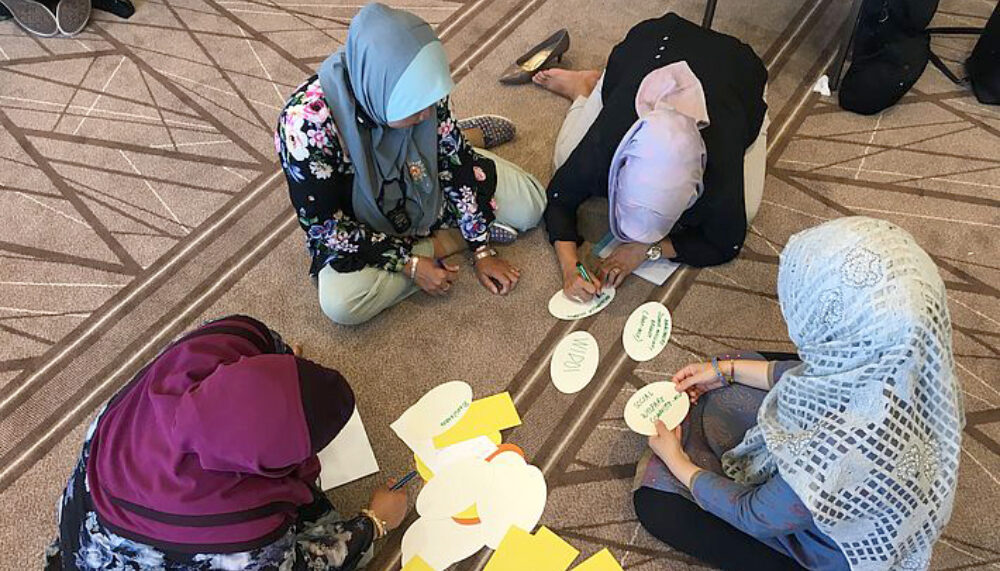BLOG POST | 12 Sept 2022
Feminist foreign policy must be about justice and participation

Shifting power asymmetries, systemic reflection and inclusivity should be key to a feminist foreign policy.
By Beatrix Austin
We are talking about feminist foreign policy at a time when anti-gender and anti-feminist movements are gaining strength, visibility and allies. Have we missed the boat?
On the contrary.
Forty years ago, author Audre Lorde wrote: “I am not free while any woman is unfree, even when her shackles are very different from my own.” The word and notion of feminism come with heavy baggage, yet they simply envision a different, fairer world – in which women and men of many diverse identities can be true to themselves and can therefore create healthier societies and a survivable planet in light of the climate crisis as well as crises of poverty, displacement, or public health. Gender equality in this sense is a joint undertaking. Men too have an important role in it in the same way straight people need to be involved in the LGBTQI struggle, and free people in the anti-slavery movement.
Gender in its current form however can be seen as a social and cultural system of oppression (side by side with other systems, such as class, ethnicity, ability, and others). Cases in point: There are slightly more women than men in the world, yet most positions of power and prestige are held by men. In our core field of peacebuilding and conflict transformation, only around 6% of high-level mediators are female (CFR: Women’s Participation in Peace Processes). Feminism is often seen as a “women’s cause” – in a feminist foreign policy, it needs to be undertaken in a way that wins others to this cause.
Benefiting society as a whole
Feminism does not imply that women are better people – it points to a particular type of power asymmetry and imbalance. Feminist foreign (as well as security, development, etc.) policy, therefore, need to subscribe to the key principle of shifting this power, and other injustices and imbalances. From a conflict transformation perspective, we add the principle of doing this non-violently and for the benefit of society as a whole. This requires keen attention to culture and education, since “culture does not make people, people make culture” (Chimamanda Ngozi Adichie in her Ted Talk We should all be feminists). Culture preconditions systems of inclusion and exclusion, of expertise, of power. For more equal gender and human relations, peace education on human rights, justice and power sharing must be strengthened from an early age and throughout.
Feminist policies must be guided by the transformative potential of a human rights-based approach to promote deep societal change and achieve economic and social justice. All instruments and actions must create space for participation, inclusivity and shared ownership and responsibility. For example, the empowerment of women must be accompanied by attention to their diversity e.g. in terms of race, class, gender, ethnicity, ability, and sexual orientation. There must be a focus on strengthening peaceful masculinities at the same time.
Feminist policies must be guided by the transformative potential of a human rights-based approach to promote deep societal change and achieve economic and social justice.
System analysis and listening skills
Such principles call for “unsettling” action. Unsettling action is uncomfortable and will meet with resistance. Any feminist policies will demand deep changes and a joint, hard conversation about justice.
Against this backdrop and in the context of my work for conflict transformation at the Berghof Foundation, any action, therefore, needs to begin with a joint analysis of power, power asymmetries and imbalances, structural causes of conflict and legacies of historical violence. This results in a systemic reflection of both intended and unintended, immediate and delayed consequences of equalizing shifts in these power relations – between men and women, elite and working class, urban and rural citizens, but also more broadly between those customarily excluded from decision making and those at its centre. This includes, but is not limited to, reflecting how LGBTQI people are included in the Women, Peace and Security agenda; that mediators who are women of faith may be uniquely placed to facilitate transformation in some conflict settings; or what role female ex-combatants can play in reintegration and reconstruction, according to their own visions.

Act together and allow for error
Our work in conflict transformation starts with listening and continues with acting together – this is what we aim for when doing participatory research and why ownership by local project partners is an essential part of our peace support work. This also entails constant, critical reflection of our approaches and instruments. It is essential to be flexible and creative in developing ways of meeting the needs of our partners, for example, when female mediators in the MENA region tell us that what they would need much more than capacity-building, are protection and security to develop their own processes and methods. Feminist foreign policy, with its greater space for new power actors, must not make the mistake of measuring them with unreasonable yardsticks – our colleagues say: “give us the space and allow us to do things differently, allow us to make mistakes”. Feminist foreign policy must also include a keen awareness for how things are done “at home”, and how our own institutions are often in need of reform and reflection on ill-guided processes and mechanisms.
Feminist foreign policies require great ambition and humility. For their success, they need to be planned in a step-by-step and tailored approach (“incrementalism”); they need to be understood in their interaction with different, overlapping systems of privilege and exclusion (“intersectionality”); and they are implemented with honesty, allowing for mistakes and learning.
This blog post has been put through a passionate and productive exchange amongst a peer group of colleagues and stands on their shoulders. Thank you Mandana Afshar, Andrew Gilmour, Johanna Lober, Florian Lüdtke, Linda Maurer, Evelyn Pauls, Nina Strumpf, and Natascha Zupan.
Media contact
You can reach the press team at:
+49 (0) 177 7052758
email hidden; JavaScript is required


